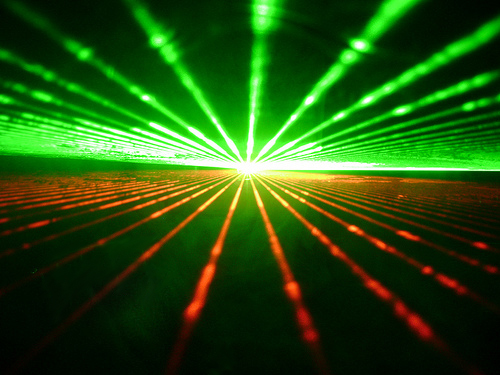Govt sponsors encryption on the cheap

The Federal Government has tipped $1.2 million into locally-developed quantum cryptography technology, which will be available to buy in a year.

(Lasers image by Douglas Muth,
CC BY-SA 2.0)
The second-generation technology, called the Quantum Link Encryptor (QLE), promises to dramatically lower the cost of "unbreakable" quantum cryptography systems by using off-the-shelf telecommunications equipment, which is possible thanks to the use of a finely-tuned laser that transmits data.
A one-time pad, which holds the decryption keys required to view encrypted data, is transmitted over a laser that has the ability to detect data interception attempts since they disturb the beam. The process is called quantum key distribution.
Present systems use single photos to distribute information, which requires specialised equipment that the technology's developer QuintessenceLabs said typically costs more than $100,000.
The QLE, which works over any standard Windows desktop application, is expected to be significantly cheaper and is set for commercial availability within 12 months. It must first undergo a year of trials with Australian companies and agencies, over both fibre and wireless communications technologies.
Telstra has offered its fibre networks and technicians for the trials after the QLE beat some 200 competitors to win the telco's research and development program.
Co-creator of the technology and founder of QuintessenceLabs, Vikram Sharma, said the unbreakable key has generated interest from Australian organisations and agencies such as the Department of Defence.
"Governments still need to transport one-time pads using human couriers," Sharma said.
"A finely-tuned laser much like that used in conventional telecommunications allows [QLE] to be faster and cheaper."
He said algorithms capable of decoding present encryption already exist, but require a quantum computer to operate. Those computers are still being researched, but Sharma said the QLE would be unbreakable even with significantly more computer resources.
The trials will test the QLE's compatibility with common telecommunications infrastructure and its ability to resist hacking.
While the technology is accepted as unbreakable, Sharma noted a system's security is only as tight as its weakest link, meaning all infrastructure must be secured.
"Effective security requires a continuum of technology across the points of vulnerability. This technology guarantees the security of information only in transit," Sharma said.
The project had already received $1 million in public seed funding from AusIndustry and a further $2 million from a contingent of private investors.